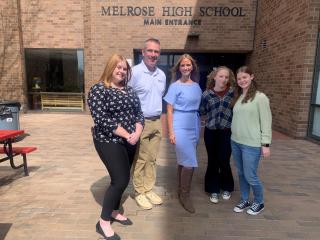MHS Sophomores Lead Launch of High School Cafeteria Compost Program

The Melrose High School (MHS) Environmental Club will launch the high school’s first Cafeteria Compost Program – a program that has been a year in the making – on Monday, April 24, to coincide with the City’s observation of Earth Week.
MHS Sophomores and Environmental Club members Maizie Frakt and Kensington Ludlum first initiated the Cafeteria Compost Program as a pilot program in 2022 as an effort to reduce food waste at the high school, to further reduce local methane emissions, and contribute to the production of nutrient-rich soil.
The pilot program consists of collecting food scraps and waste from the high school cafeteria’s kitchen and food prep areas in compost bins that are picked up weekly by Black Earth Compost, an organization that services households, businesses, municipalities, and schools to assist in reducing food waste and returning nutrients to the soil.
“Maizie and Kensington began working on the Compost Program last school year but have been researching the environmental benefits of composting since their eighth-grade civic project,” said MHS teacher and Environmental Club faculty liaison Suzanne Troy. “The pilot program was a way for the students to troubleshoot any issues and further their research before introducing the program to the student body.”
On Monday, April 24, the successful program will be fully implemented in the high school cafeteria with the addition of compost bins in the student section of the cafeteria two days a week and eventually every day by the next school year.
The program is funded through the Melrose DPW via a grant from the Recycling Dividends Program (RDP) funds through MassDEP to support and encourage recycling participation in municipalities.
In the past, RDP funds have been used to improve City Yard operations and to create educational signage, flyers, and other materials to educate Melrose residents about recycling.
Funding the Compost Program at MHS is just one way the DPW has further expanded the uses of this grant money and is continuing to work on finding more ways to apply this money toward benefiting the City of Melrose in the future.
